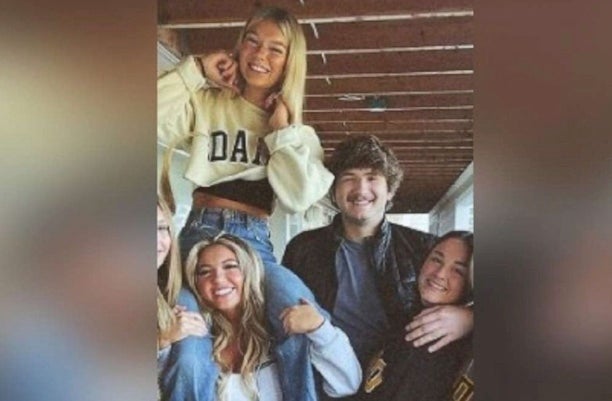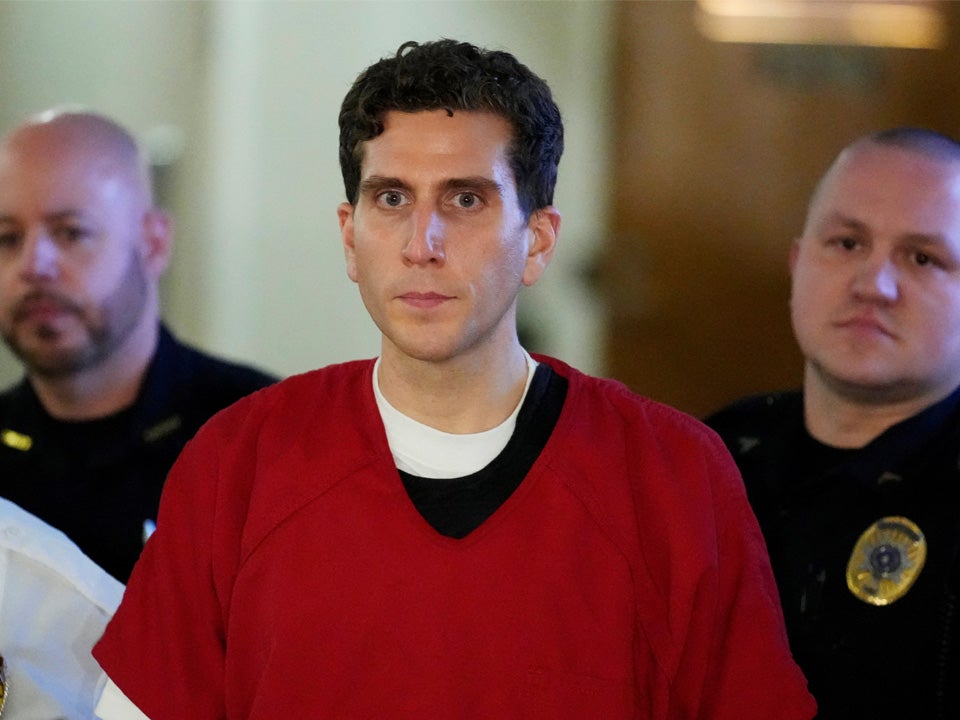Bryan Kohberger called Idaho murders a ‘crime of passion’, neighbour says
Kohberger’s neighbour claims the criminology student brought up the brutal slayings in casual conversation weeks before his arrest
A suspect charged with murdering four University of Idaho students allegedly brought up the case in a casual conversation with his neighbour just days after the slayings - saying he perceived it as a “crime of passion”.
Washington State University PhD student Bryan Kohberger stands accused of brutally stabbing Kaylee Goncalves, Xana Kernodle, Madison Mogen and Ethan Chapin at an off-campus home in the college town of Moscow on 13 November. It took seven weeks for Mr Kohberger to be linked to the killings, resulting in his arrest late last month.
One of Mr Kohberger’s neighbours in Pullman, Washington, a few miles across the Idaho border from Moscow, has now come forward to claim the suspect mentioned the killings to him soon after they occurred, when very few details about the investigations were available to the public.
“He brought it up in conversation,” the neighbour told CBS News on Wednesday. “[He] asked if I had heard about the murders, which I did. And then he said, ‘Yeah, seems like they have no leads. Seems like it was a crime of passion.’”
The neighbour’s account bears contrast to those of Mr Kohberger’s classmates, who have said he was unwilling to discuss the case.
The revelation comes on the same day of Mr Kohberger’s second court appearance in Idaho, following his extradition from Pennsylvania, where he was initially arrested.
At Mr Kohberger’s brief appearance in Latah County Courthouse in Moscow on Thursday, he spoke only to answer “yes” when asked if he understood his rights to a speedy preliminary hearing within the next 14 days and if he agreed to waive those rights.
Public defender Anne Taylor then requested that his next court date be pushed back until June so the defence could have more time to review the evidence against Mr Kohberger. The prosecution agreed to the request and the judge scheduled the preliminary hearing for the week beginning 26 June.
Mr Kohberger is said to be planning to fight against the allegations that he broke into a student home in Moscow in the early hours of 13 November and stabbed the four students to death in a savage knife attack.
Jason LaBar, the attorney who represented in Pennsylvania, said that Mr Kohberger was “eager to be exonerated”.
In an affidavit released on 5 January, investigators revealed they found Mr Kohberger’s DNA in a knife sheath discovered next to the body of one of the victims. Additional evidence, such as surveillance video of Mr Kohberger’s white Hyundai Elantra near the crime scene and data from his cellphone also connects him to the murders, police say.
The motive for the murders is unknown and it remains unclear why Mr Kohberger allegedly targeted the victims.
An attorney representing Goncalves’ family said that “no connection” had been found between the four students and the suspect.
However, cellphone data suggests that Mr Kohberger stalked the student home at least 12 times in the run-up to the night of the murders, according to the affidavit.

As a criminal justice PhD student at Washington State University, he lived just 15 minutes from the victims over the Idaho-Washington border in Pullman.
Cellphone data also places him close to the home on King Road at around 9am on 13 November – suggesting that he returned to the scene of the crime just hours after allegedly murdering the four victims at around 4am.
The affidavit reveals that other evidence also led them to arrest Mr Kohberger for the student murders.
Police said that his DNA was found on a knife sheath left behind at the scene by the killer.
A white Hyundai Elantra spotted at the crime scene at the time of the murders was also traced back to the suspect, the affidavit reveals.
One of the victims’ surviving roommates was also able to partially describe the killer to investigators after she came face to face with him in the aftermath of the murders.
In her terrifying account to investigators, she revealed that she heard the killer inside the home and heard what sounded like crying coming from one of her roommates.
At one point she heard a woman’s voice – believed to be either Goncalves or Kernodle – saying something to the effect of “there’s someone here”, before hearing a man’s voice saying “it’s ok, I’m going to help you”.
She then had a lucky escape as she opened her door to see what was happening and witnessed “a figure clad in black clothing and a mask that covered the person’s mouth and nose walking towards her”.
The man walked right past her and headed toward the back sliding glass door of the home.

The description she gave – a male with bushy eyebrows who was around 5 foot 10 tall or taller and was “not very muscular but athletically built” – helped lead investigators to Mr Kohberger.
Investigators believe the murders unfolded between 4am and 4.25am on 13 November when all four students had returned from nights out.
At around midday the next day, a 911 call was made from the phone of one of the surviving roommates alerting police to the bloody crime scene.
The murder weapon – a fixed-blade knife – is yet to be found.
Mr Kohberger moved to Pullman from Pennsylvania in August and has just completed his first semester.
Before this, he studied criminology at DeSales University – first as an undergraduate and then finishing his graduate studies in June 2022.
While there, he studied under renowned forensic psychologist Katherine Ramsland who interviewed the BTK serial killer and co-wrote the book Confession of a Serial Killer: The Untold Story of Dennis Rader, the BTK Killer with him.
He also carried out a research project “to understand how emotions and psychological traits influence decision-making when committing a crime”.
Now, he is facing life in prison or the death penalty for the murders that have rocked the small college town of Moscow and hit headlines around the globe.



